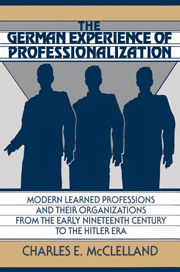 The German Experience of Professionalization
The German Experience of Professionalization Book contents
- Frontmatter
- Contents
- Acknowledgments
- Abbreviations
- Part I The problem of professions in Germany
- Part II The transition to modern professions in the early nineteenth century
- Part III Unified professions in a unified Germany?
- 5 The organization of the “free” professions: medicine, law, engineering, and chemistry
- 6 Organization of state-service professions: teachers and the clergy
- 7 Professional credentials in the new Reich
- Part IV Breakthroughs and breakdowns: The professions enter the era of cartels and unions
- Part V The Weimar era
- Part VI The fate of professions under and after fascism
- A word about sources
- Index
5 - The organization of the “free” professions: medicine, law, engineering, and chemistry
Published online by Cambridge University Press: 06 July 2010
- Frontmatter
- Contents
- Acknowledgments
- Abbreviations
- Part I The problem of professions in Germany
- Part II The transition to modern professions in the early nineteenth century
- Part III Unified professions in a unified Germany?
- 5 The organization of the “free” professions: medicine, law, engineering, and chemistry
- 6 Organization of state-service professions: teachers and the clergy
- 7 Professional credentials in the new Reich
- Part IV Breakthroughs and breakdowns: The professions enter the era of cartels and unions
- Part V The Weimar era
- Part VI The fate of professions under and after fascism
- A word about sources
- Index
Summary
The unification of the German Empire in 1871 not only opened a new era in European history; it created radically new conditions for the German professions as well. Under these conditions the professions were able to organize and find their own voices as never before. The contemporaneous rapid transformation of Germany into an industrialized, urbanized country with a rapidly growing population (and an even more rapidly growing cadre of professionals) brought ineluctable forces of change to bear on the professions, too, in the decades following the Reichsgründung. Quantitative changes, such as the growth of employment possibilities for professionals, were often accompanied by qualitative changes, such as heightened competition within the professions, new types of professional working conditions, and nagging concern about the status of professionals in the rapidly shifting structure of German society.
It should be recalled at the outset that the German Empire created in 1871 was hardly a monolithic new nation-state, but initially an extension of the North German Confederation of 1867 to include the three South German states of Bavaria, Württemberg and Baden. It was not entirely German, because large ethnic minorities lived within its frontiers – notably French in the west, Danes in the north, and Poles in the east. It was an empire in that it had a hereditary emperor in the House of Hohenzollern. But it also remained a confederation of kings and other princes, with three ancient urban republics.
- Type
- Chapter
- Information
- The German Experience of ProfessionalizationModern Learned Professions and their Organizations from the Early Nineteenth Century to the Hitler Era, pp. 73 - 97Publisher: Cambridge University PressPrint publication year: 1991
